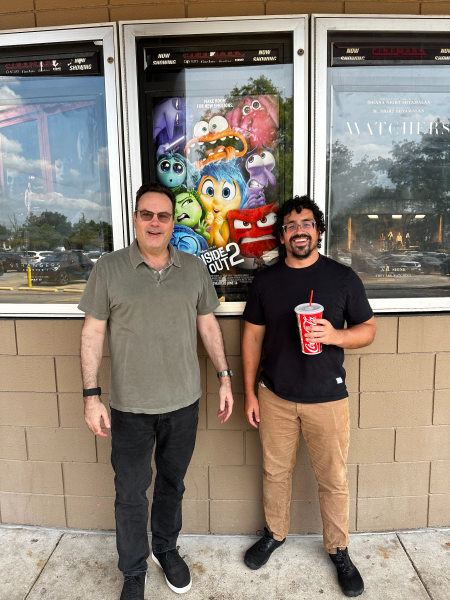My adult son took me to a Pixar movie and Dallas' version of NY Deli today for Father's Day.

Pixar movies never cease to amaze me. Whether you're a child, a teenager, or an adult, there's always something to enjoy and take away from them.
I especially enjoyed watching it next to my 31-year-old son and noticing that he responded emotionally to the same scenes I did. On one hand, it felt good to see what he processed and how he internalized things similar to the way I do. On the other hand, I thought, genetics is a bitch.
Jokes aside, having great kids is a double blessing. It's nice to be proud of who your kids are and the things they do. It's also nice to feel proud of the small part you played in helping them become who they are.
In addition, this weekend, I spent some time thinking about my father and what a terrific influence he had on so many lives.

My Dad was incredibly loving ... yet he was also incredibly demanding.
For example, after winning the State Championship in the shot put, I watched him run down from the stands. I figured he was coming down to celebrate. Instead, he looked deeply into my eyes and asked whether I was disappointed that I did not throw a personal best that day? I replied: "But Dad, I won." He smiled and recognized that winning was important too ... then he reminded me that the other throwers were not my real competition. To be and do your best, the competition is really with yourself ... and we both knew I could do better.
My Dad believed in setting high standards. He explained that most people's lives are defined by their minimum standards. Why? Because once those standards get met, it is easy to get distracted by other things and how to meet the minimum standards for them as well.
The point is to set a higher standard and to have a better life.
Here is another one of his favorite sayings. "The difference between good and great is infinitesimal." This applies to many things. For example, people who are good take advantage of opportunities; people who are great create them.
Here is something else worth sharing. "It's not over until we win!" This concept underscores the importance of resilience, commitment, and grit. My Dad emphasized that many people quit when they're on the brink of victory, simply because they don't realize how close they are.
This has led me to develop several practices. For example, if I pick up a book, I won't put it down until I finish a chapter. If I start a game, I can't stop until I exceed a specific score or level. And when I exercise, there's no way I'd ever stop before finishing a set.
Integrating these concepts involves aligning your head, heart, and feet. What I mean is that it's one thing to know the saying. It's another to make it a value or belief. And it's another thing altogether to make it a practice.
Well, that should explain a little of my dysfunction ... but, if you can't mess up your own kids, whose kids can you mess up?
Hopefully, you had a happy Father's Day weekend.
30+ Years Of The Internet ...
When people think about CERN, they generally think about nuclear research, the Large Hadron Collider, and other physics research.
But, CERN was also where Tim Berners-Lee invented the World Wide Web. In March of 1989, he published “Information Management: A Proposal,” which outlined his vision for what would soon become the World Wide Web.
CERN also had the first website ever to exist. Luckily, they kept the site up and will let you view it in the old-school line mode.
It's been 35 years since the release of the World Wide Web (the Internet is said to have been invented six years earlier with the invention of TCP/IP).
Think how much that one invention has had on the world.
Information Gathering
I remember being in law school, going to the library and scanning through microfiche (or actual books) to study or do research.
I remember reading encyclopedias (and photocopying relevant articles).
I remember paying for newsletters that were mailed to me (or paying extra for fax delivery).
Having access to more data or faster delivery was a huge advantage.
Today, you have all the information you could ever ask for at the tip of your fingers ... Google and Wikipedia are just the tip of the iceberg.
There is almost too much information now. It is hard to separate the signal from the noise. It seems like anyone can find justification for almost anything. The result is lots of data, but too little knowledge.
Part of what is needed is a way to help people make better decisions about what to trust, what it means, and what to use.
Social Interaction
People record every moment, every intimate detail of their lives online, contrasted by a fear of strangers and letting children roam.
While riding around the neighborhood on your bike to see if your friends could come out to play is by no means outlawed - it does seem passé.
Chat rooms, Facebook, Online multi-player ... many people's key friendships are born and kept online.
I remember my son, 13 years old at the time, sending 10,000+ texts a month and thinking it was a phase. I was wrong.
The internet has radically changed the structure of relationships - for better ... or often worse.
Privacy ( ... or the lack of it)
One of the most significant changes is that we (as individuals) have become productized. We take advantage of all these free resources at the cost of being pixeled and cookied into oblivion. We've chosen convenience over safety.
Remember, if you’re not paying for a product - you are the product.
Little bits of our private information, demographics, and psychographics are sold to advertisers to create smarter ads and new offers; and, realistically, we have very little control over that.
It’s been proven time and time again that giants like Google and Facebook will find ways to sneak your data to advertisers even when it’s “illegal” with a slap on the wrist.
Data protection is a massive issue not only for corporations but for individuals. While many companies are trying to manage your privacy while still monetizing your data, there are just as many companies who couldn’t care less.
The GPDR - while frustrating for many - is a step towards protecting individuals.
For every action, there is a reaction. Likewise, every benefit has a cost. The internet is a fantastic tool - but it can also be a scary weapon.
What will the next 30 years hold for the Internet?
It has been ~30 years since the Internet's inception, and there's still radical growth coming.
We’ve gone from bit speeds to megabyte speeds (and if you're lucky, even gigabyte speeds). We’ve gone from crappy-quality video taking hours to download to streaming HD-quality video live.
How do you imagine that the Internet will evolve?
What influence do you think the Internet of Things will have?
It’s hard to foresee how innovation and regulation will change the internet, but it’s clear there will be change.
We live in exciting times!
Posted at 09:01 PM in Business, Current Affairs, Gadgets, Healthy Lifestyle, Ideas, Market Commentary, Science, Web/Tech | Permalink | Comments (0)
Reblog (0)